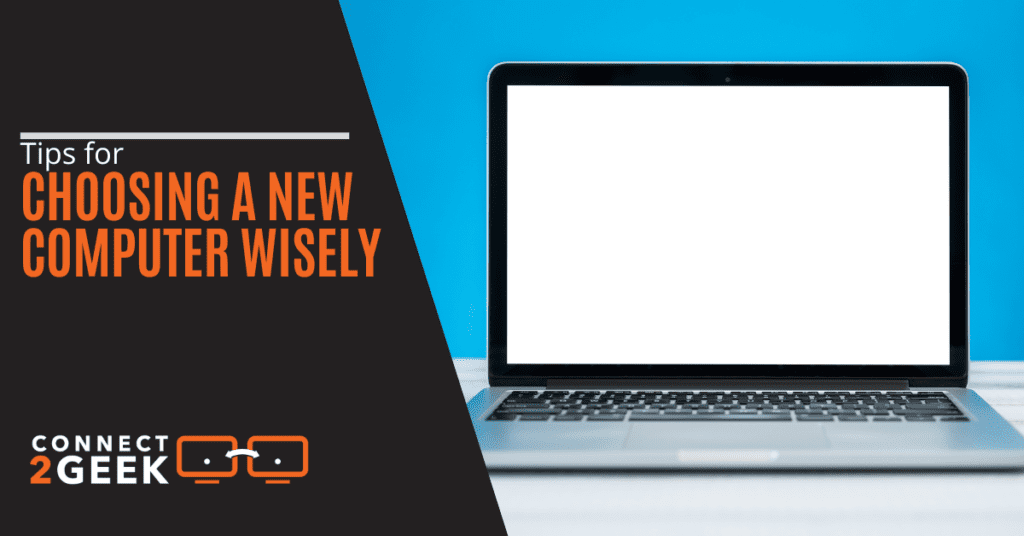
So, you’re thinking about buying a new computer. It’s an exciting prospect, but also a little daunting. You’re not sure what technical specifications are best for your needs, and you want to make sure you get good value for money.
With that in mind, in this blog we’ll explore all the factors you need to consider when purchasing a new computer, and demystify all the jargon you’ll come across during your search.
Should I Go For A Desktop Computer Or A Laptop For My Home?
The first thing to decide on your quest for a new computer is whether to go for a laptop or desktop. It used to be that desktop computers were much more powerful than laptops. However, these days, premium laptops easily compete with desktop computers in terms of performance.
Because of this, we recommend thinking about how you’d like to use your new computer. If you’d like to take it out and about with you, or work in different areas of your home, then a laptop is the more flexible option. However, if you plan to keep your computers in one allotted space, then it makes sense to go for a desktop.
Factors To Consider
A few terms will crop up again and again as you browse for your new laptop or computer. Below, we’ll explain what these mean.
Processor
The processor, also known as central processing units (CPUs), is essentially the mind of your computer, responsible for driving the operations of your device. Your device processor is very tricky and expensive to upgrade, so you want to choose a suitable one the first time round.
The higher the processor speed, the better. This measurement is usually portrayed in gigahertz (GHz). You also want to look at the cores. Modern processors tend to be multi-core, meaning they use several processors that work together collaboratively. The more cores the device has, the more complex applications it can handle.
RAM
RAM stands for Random Access Memory. Think of it like your device’s short-term memory. When you open an application or file, this is loaded into your device’s RAM. RAM works with the device processor to enable your laptop or computer to run swiftly and efficiently.
RAM is measured in gigabytes (GB) – but don’t mix this up with device storage, which is also measured in GB.
When it comes to RAM, we recommend going for at least 4GB for typical everyday usage. If you want to use your device for gaming, graphic design or something more specialist, consider going for the higher end. 8GB or 16GB should do, although this is more expensive.
Side note, it’s pretty simple to upgrade your RAM after you’ve purchased a device. So, if 8GB is a little too pricey for you right now, you can always upgrade RAM later down the line.
Operating system
The operating system is responsible for the look and feel of your computer. It’s the central interface. The two main operating systems are Windows or Mac OS. Mac OS comes with all Apple products, like MacBooks or iMacs. The majority of other devices rely on Windows.
The one you choose comes down to personal preference. Mac OS is great for people who already use iPhones, as the devices are designed to communicate with each other, so you can easily share photos and other content between devices.
The downside is that Mac OS comes with its own range of applications for writing documents, spreadsheets and presentations. So, if you’re a Microsoft Office fan, you’ll either need to purchase this as an add-on to your new device, or get comfortable with the Mac OS versions.
Windows is generally a lot more accessible, in that its programs and games are available on a wide range of computers, meaning you’ll have more choice. Windows devices can also come in at a lot cheaper!
Storage
The storage aspect of your device is its long-term memory, where all files and applications live. The more storage space on your device, the better. For the average user, 500GB of storage should do the trick.
Remember, too, that with advancements in cloud storage you can now store your files in applications like Google Drive or Box instead of locally on your device. Bear this in mind as you shop for devices, as computers with lots of storage tend to be more expensive. The cloud is an alternate, cheaper solution.
Need Advice On Choosing the Right Device?
Our Geeks have over 30 years of IT experience with all types of computers and networking systems. When you call us, you know you’re getting an expert. And not to brag too much, but we have customers that have been with us for decades!
That’s because we love helping folks in Nampa, Boise, and the Treasure Valley area get the most from technology. So, call 208-468-4323 or fill out our contact form to reach us.
